| |
|

Scholar-in-residence
● Rabbi Ari
Kahn, director, Foreign Student Programs,
Bar Ilan University, Israel, Feb.
22-23
Presentations are free; kosher meals moderately priced
Call us for details at (619)
287-9890, Please reserve Shabbaton meals





Writer has 'out of this world' name
By Peter Garas
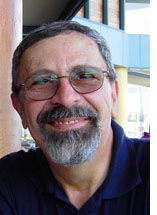 CANBERRA, Australia— I have always suggested to friends that if they wanted to get their name up in lights, the easiest way was to change it to "Exit" CANBERRA, Australia— I have always suggested to friends that if they wanted to get their name up in lights, the easiest way was to change it to "Exit"
Since this did not go down well with most of the people I know, they always felt that I was being disparaging, I did not tell them the easy way to get one's name into space and the history books.
I can finally reveal that I can make the claim to being and having been in space!
Well, not me personally, but certainly my name.
I have no idea how many others (of the million people involved) are or were Jewish.
I can however say that I am one of those Jews who can honestly say that my name, at least, has transcended it's earthly bounds and has been and probably still is travelling in space.
Fascinated by science fiction from a very early age I knew that the likelihood of my living long enough for space travel to become common place was a remote possibility. Having the wealth to be able to buy a place on a shuttle or something similar was also likely to be completely out of my reach.
So way back in the 1990's when there was a planned mission to collect material from a comet (see STARDUST) my name was included among the million who participated.
Stardust was launched on February 7, 1999 carrying the two microchips. Two copies of each chip were installed on the spacecraft (for a total of four chips). Two of the microchips (#1 & #2) are inside the Sample Return Capsule, and were returned back to Earth with the capsule when it landed in Utah on January 15, 2006. The capsule along with the microchips were transported to the curation facility at Johnson Space Center in Houston, Texas on January 17, 2006, where they currently reside. The other two chips are on the spacecraft body and will remain in space forever.
If you don't believe me check it out at http://stardust.jpl.nasa.gov/overview/microchip/names2g3.html
To your amazement (or horror,) you will find my name on this somewhat lengthy list!


What kind of plague is darkness?
By Rabbi Michael Berk
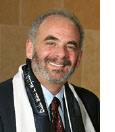 LA JOLLA, California —We are in a kind of countdown towards Passover, the great and original Festival of Freedom. One of the last steps in securing the freedom of the Israelites was the plague of darkness which enveloped Egypt. A ten-year-old yeshivah student was studying the plagues for the first time and was puzzled about the plague of darkness. “What kind of plague was that? After all, they could have lit their lamps and been able to see despite the darkness. Isn’t that what they did every night when it got dark?” His rabbi answered: “The darkness from which the Egyptians suffered was a special kind of darkness… it was a darkness that afflicted the heart. They could physically see, but they didn’t feel for each other. Each person saw only himself; and that is a terrible plague.” LA JOLLA, California —We are in a kind of countdown towards Passover, the great and original Festival of Freedom. One of the last steps in securing the freedom of the Israelites was the plague of darkness which enveloped Egypt. A ten-year-old yeshivah student was studying the plagues for the first time and was puzzled about the plague of darkness. “What kind of plague was that? After all, they could have lit their lamps and been able to see despite the darkness. Isn’t that what they did every night when it got dark?” His rabbi answered: “The darkness from which the Egyptians suffered was a special kind of darkness… it was a darkness that afflicted the heart. They could physically see, but they didn’t feel for each other. Each person saw only himself; and that is a terrible plague.”
Judaism is a great antidote to narcissism, because it expects us to “see” each person on this earth as a human being, created in God’s image with needs, feelings, fears, hungers, hopes – a human being who is like us, who is a child of God just as we are, who is fully entitled to be treated with the dignity, justice and compassion we expect for ourselves. I think this might be the most important message Judaism has ever taught. It is the entire basis of our religion. The most revolutionary idea Judaism introduced to the world is the idea of betzelem elohim – humanity created in the image of God. That’s why the Torah says you cannot kill a slave — he’s also created in God’s image. That is why the Saadia Gaon could make the stunning statement: “One who slaps a human being slaps the face of God.” God is not just a force of nature; God is not just a Creator; God is a God of history, the God of possibilities. Before Judaism no one ever imagined slaves could be free.
Sacred communities remind us to keep our vision sharp – to be like Moses who, though raised in a privileged household, was able to see the pain of other human beings. He was not blinded by the plague of darkness: he saw and he cared and he acted.
That is why the social justice and acts of loving kindness we do in our congregation are so important. It explains why we collect food for the hungry, build homes for the homeless, collect books for the needy, support Israel and work to save Darfur, visit the sick, arrange rides, reach out to others in our community and more. We do this work because we must, if we wish to rightfully consider ourselves a Jewish congregation.
I hope your affiliation with our sacred community improves your “vision” and helps you see where you are needed in this world. Everything depends on our ability to “see” one another - to be truly caring for each other and for those with whom we share this planet. The Torah tells us that during the plague of darkness in Egypt, “all the people Israel had light in all their dwellings.” This is one of the primary reasons for CBI (Congregation Beth Israel) to exist – to help each of us see and care. Only when we see others, when we see the divine in everyone around us, only when we see that we are, in fact, all God’s children, only then can we preserve and promote the humanity within ourselves.


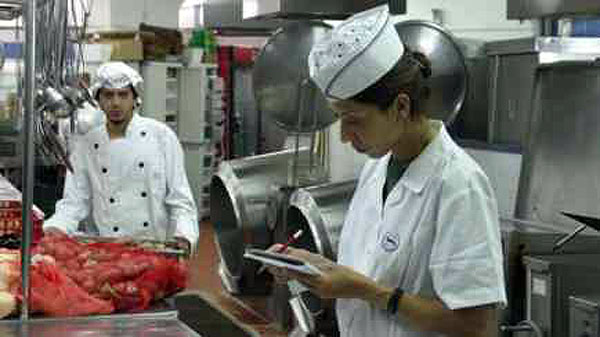
THE JEWISH CITIZEN
Aviva, what part of you would you sell?
By Donald H. Harrison
 SAN DIEGO—Aviva My Love poses a provocative question. Imagine you are a woman, struggling to keep your family financially afloat in the wake of your husband’s job layoff. A dentist propositions you; just let him see you naked and he will reduce his exorbitant bill. “Absolutely not, rot in hell, you pig!” you might say. SAN DIEGO—Aviva My Love poses a provocative question. Imagine you are a woman, struggling to keep your family financially afloat in the wake of your husband’s job layoff. A dentist propositions you; just let him see you naked and he will reduce his exorbitant bill. “Absolutely not, rot in hell, you pig!” you might say.
But now, imagine that your financial situation goes from bad to worse, and you get another proposition—not to sell your body, but to sell the stories that you had hoped someday could be fashioned into your first book. If you were to comply with this offer—selling the fruit of your mind—would you have prostituted yourself? Or would you simply be pragmatic?
Are the two propositions the same? Is someone who “sells” herself –her physical self or her creative self—nothing more than a whore?
 The 107-minute Hebrew language, English subtitle film by Shemi Zarhin, which won six Israeli Academy Awards, will be presented during the 18th Annual San Diego Jewish Film Festival at 4:30 p.m. Thursday, at the AMC La Jolla. The 107-minute Hebrew language, English subtitle film by Shemi Zarhin, which won six Israeli Academy Awards, will be presented during the 18th Annual San Diego Jewish Film Festival at 4:30 p.m. Thursday, at the AMC La Jolla.
An interesting sub-theme of this movie is that Aviva Cohen (Asi Levi) is able to draw inspiration from her life which is in tumult. Her mother Violet (Levana Finkelstein) is constantly appearing int her apartment window, either exposing herself naked to the world or threatening to jump. Aviva's husband Moni (Dror Keren) has been out of work for so long that he has come to doubt his manhood. Her sister Anita (Roten Abuhav) has been trying without success to become pregnant. Her brother-in-law Ariyeh (Natan Ravitz) wants nothing more than to leave his home in Tiberias and move to Tel Aviv.
And that’s only the older members of Aviva's troubled family. She has a daughter just out of the Army who feels she has no purpose in life, and a son just going into the Army who suffers from sexual dysfunction. Then there’s a younger boy who hardly can be budged from in front of the television screen. Aviva works as a cook in a large hotel kitchen; and although her boss wants her to work more hours, she fears that by doing so she will give up what little time she has, amid the hubbub, to write.
Everywhere Aviva goes, she encounters interesting characters throbbing with life’s problems. We see this in juxtaposition with the life of her mentor Oded Zar, who is also a famous novelist. He has been intellectually sterile in the decade since his wife and child have left him. Though he can coach Aviva on some tricks of phrase-turning, new ideas shun him.
In one scene, we see the paucity of his intellect symbolized. He tells Aviva, who visits him at his apartment, that he did not offer her anything to eat because there is nothing in the refrigerator. She replies that there really never is “nothing” in a refrigerator, and then finds some tomatoes which she prepares with eggs and garlic.
A delicious creation!


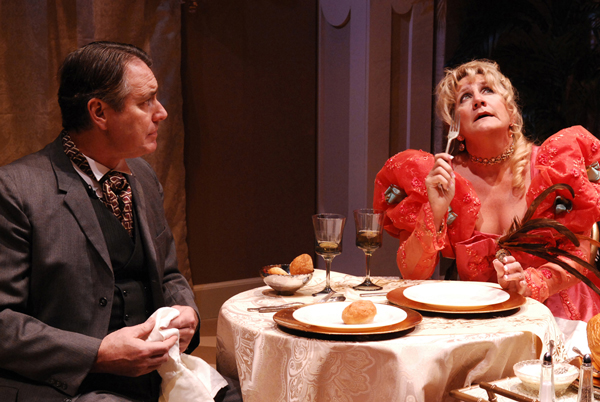
ARTS IN REVIEW
This 'Dolly' is bound to improve with age
By Carol Davis
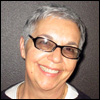 CORONADO, California —Just recently, Lamb’s Players Theatre opened its 2008 season with the Jerry Herman (music and lyrics)/Michael Stewart (libretto) 1964 musical Hello Dolly based on Thorton Wilder’s classic The Matchmaker. When Hello Dolly opened on Broadway it opened to four rave reviews and two favorable. It didn’t have one pan. It won the New York Drama Critics Award, two Outer Critics Awards for Actor and Actress (1967-‘8), ten Tony Awards for Best Musical, Actress, Author, Producer, Director, Composer and Lyricist, Scenic Designer, Costumer Designer, Choreographer, Conductor and Musical Director. It played on Broadway for 2,844 performances. At the time it was the longest playing Broadway musical and its star was Carol Channing. CORONADO, California —Just recently, Lamb’s Players Theatre opened its 2008 season with the Jerry Herman (music and lyrics)/Michael Stewart (libretto) 1964 musical Hello Dolly based on Thorton Wilder’s classic The Matchmaker. When Hello Dolly opened on Broadway it opened to four rave reviews and two favorable. It didn’t have one pan. It won the New York Drama Critics Award, two Outer Critics Awards for Actor and Actress (1967-‘8), ten Tony Awards for Best Musical, Actress, Author, Producer, Director, Composer and Lyricist, Scenic Designer, Costumer Designer, Choreographer, Conductor and Musical Director. It played on Broadway for 2,844 performances. At the time it was the longest playing Broadway musical and its star was Carol Channing.
The central character, Dolly Gallagher Levi (Kerry Meads) is described in the ‘Dolly Home Page,' as dynamic, positive, loud, commanding, fearless Jewish mother-type with quick-witted focus on her own and others’ needs and the means and decisive and confident intelligence and speedy tongue to make things happen’. Dolly’s late husband, Ephraim Levi taught her to ‘send his money circulating among the people like rainwater’, or as Tovah Feldshuh (who played Dolly at the Paper Mill Playhouse recently) claims in an interview with Judy Wilson of New Jersey Jewish News “ it’s more like tikun olam." Now a widow, she invents herself as a matchmaker, dance instructor and anything else she can do to earn a living. She’s a Mrs. Fix-it. And if she doesn’t know how, she knows someone who does.
The story takes place in the late 1800’s in Yonkers, N.Y. where wealthy grain merchant Horace Vandergelder (David Cochran Heath), who describes himself as ‘rich, friendless and about as high as you can go in meanness’ and a half-millionaire, hires Dolly to whisk his niece, Ermengarde (Erika Beth Phillips) off to New York City to protect her from the attentions of Ambrose Kemper (Jon Lorenz) a starving artist and the young man she loves. In that same conversation with Dolly, he also reveals that he has intentions of marrying the widow, Irene Malloy (Colleen Kollar Smith), a New York milliner.
Dolly hatches the idea that Vandergelder will, instead, marry her. She devises a complicated, manipulative and well-timed plot to keep Horace for herself. She also succeeds in matching up the widow with Cornelius Hackl (Lance Arthur Smith) Vandergelder’s clerk and his assistant Barnaby Tucker (Steve Limones) with Minnie Fay (Season Duffy) Mrs. Malloy’s assistant while keeping the audiences engaged in the shenanigans at the same time. Her strategy takes them from Yonkers, to Malloy’s Hat shop, to the streets of New York and finally to the Harmonia Gardens, an elegant restaurant where everyone from Rudolph (Ralph Johnson) the mâitre’d to the bus boys, knows Dolly. It’s here that the famous “Hello Dolly” is sung!
While all this is happening, some other familiar tunes, “It Takes A Woman”, “Put On Your Sunday Clothes”, “Before The Parade Passes By," and “It Only Takes A Moment” are playing out under the musical direction of G. Scott Lacey. The musical is directed by Robert Smyth, choreographed by Colleen Kollar Smith and presented on Mike Buckley’s creative set with three turnstiles allowing for different locations, with the musicians perched above in a cozy alcove.
Over the years, with Ms. Channing, Barbra Streisand, Pearl Bailey, Mary Martin, Tovah Feldshuh and a host of others who played Dolly either on stage or in the movies, Lamb’s Associate Artist Kerry Meads has some pretty big shoes to fill and I must say she has the personality, wit, comical timing and verve to pull it off. The one thing lacking on opening night was her voice. It was strained and off the mark. Her interactions with Cochran Heath’s (another long time associate) is picture perfect, however, and between her little cat and mouse games and his blustering mutterings, some of the most amusing moments of the evening came to life. But there was much lacking as well to give it the feel of a ‘not quite ready for prime time’ show.
Much of the ensemble, which consisted of the dancers/waiters while young and energetic, were not in sync with the music and with the exception of Colleen Kollar Smith, most of the voices were less than wonderful. There was, however, one magical moment when Leonard Patton belted out the title song, “Hello Dolly” a la Louis Armstrong (in the movie) that brought the house down. Even Jeanne Reith’s costumes, usually beautiful and fitting, especially period pieces, were either drab or unflattering particularly Dolly’s.
The good news is Dolly Levi is a wonderful character molded in the true sense of a matchmaker who sees things no one else sees and makes them happen, and who lives life to the fullest. The musical Hello Dolly is a fun and good-humored show meant to entertain and it does. I expect, as this production continues, it will pick up and improve with age. It continues at the theatre at 1142 Orange Avenue in Coronado through March 16.
See you at the theatre.

 . .
SAN DIEGO JEWISH WORLD THE WEEK IN REVIEW
Congressman Bob Filner in Washington, D.C.: The nation mourns death of Congressman Tom Lantos, a champion of human rights
Donald H. Harrison in San Diego: A Love to Hide refers to two relationships
J. Zel Lurie in Delray Beach, Florida: Hillary Clinton will be our next President
Ira Sharkansky in Jerusalem: Most Israelis favor strong retaliation against Gaza for rocket attacks
Peter Garas in Canberra, Australia: Human Rights Watch targets Israel's power cutoff to Gaza, but ignores actions by others
Donald H. Harrison in San Diego: An imaginative Israel trip for preschoolers
Sheila Orysiek in San Diego: Civil Rights Act of 1964 - Forgotten Facts
Plus: Our Australia bureau chief, Garry Fabian tells, story of his childhood in Theresienstadt, immigration to Australia
Shoshana Bryen in Washington, D.C. : Gaza crisis threatens Mubarek's rule
Donald H. Harrison in San Diego: Paying attention to Paying for Justice
Rabbi Baruch Lederman in San Diego: A Shmitah miracle in a banana orchard
Sheila Orysiek in San Diego: A letter to Margot—19 years wasn't enough
Rabbi Leonard Rosenthal in San Diego: The more you study, the more to learn
Lynne Thrope in Encinitas, California: The buzz about Firefly Grill & Wine Bar
Peter Garas in Canberra, Australia: Finding mom's effects led to columnist's study of genealogy and the Holocaust
Donald H. Harrison in San Diego: San Diegans bid farewell to Rose Schiff: matriarch to performers and educators
Donald H. Harrison in San Diego: When triplet sisters become mothers
Donald H. Harrison in San Diego: First graders receive siddurim in special presentation at Hebrew Day School
Natasha Josefowitz in La Jolla, California: Reading, writing, counting and speaking —are we as competent as we should be?
Dorothea Shefer-Vanson in Mevasseret Zion, Israel: Israeli school ceremony celebrates pupils demonstrating their reading of Bible
Ira Sharkansky in Jerusalem: Why Israel prefers to just muddle through
< BACK TO TOP
|
|
